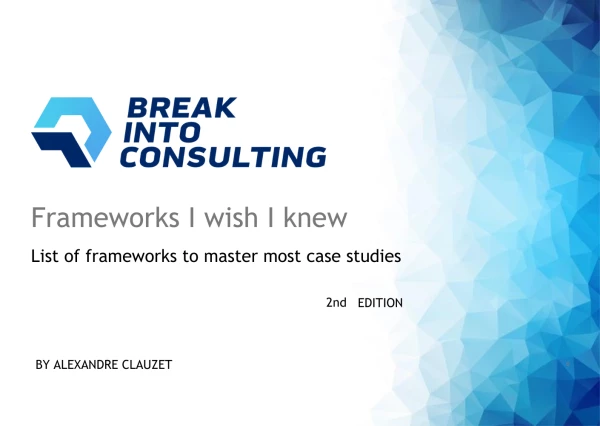Hi, I am starting my casing practice. May I know how do you guys self practice - just structuring or?
I do practice with peers and coach but am curious how do I do my self-practice. Thank you!
Hi, I am starting my casing practice. May I know how do you guys self practice - just structuring or?
I do practice with peers and coach but am curious how do I do my self-practice. Thank you!


Hey,
Self-practice is a powerful tool and can make a real difference in your progress.
The whole idea is to break down the case into individual skills and work on each one in isolation. Some of the core skills include:
You can practice these on your own, or save time and use dedicated resources (books, podcasts, or YouTube videos) that target specific skills.
As an example, you can check out Market Sizing Like a Pro, a book I personally wrote. It's a self-guided resource designed to help you master any market sizing question and sharpen your quantitative thinking.
Hope this helps!
Feel free to reach out if you want to work on a specific skill or if you’d like help identifying the areas that could have the biggest impact on your performance.

While you’re just starting out, I’d recommend focusing on (i) structuring, (ii) case math, (iii) data interpretation, (iv) brainstorming and (v) synthesis.
I would recommend using MBA consulting club casebooks (e.g., Yale, Columbia, Darden, Tuck, etc.) to practice as you start out.
It’s also worth watching examples of successful case interviews on YouTube (e.g., PrepMatter).
The most successful self practice means focusing (and being honest with yourself) on your weak areas, and trying a wide variety of cases - including non-standard ones.

Hi there,
Basically, here's what I also recommend my candidates:
1. Dedicate a good chunk of time at a time of the day when you are truly focused e.g., 1-1.5h in the morning before work / uni
2. Attempt the case in 'exam' conditions, meaning with the sort of (time) pressure like in an actual interview
3. Check the answers not assuming they are 'right', but rather with the mindset of figuring out what you could take from them to improve your own answers
4. And most importantly, reflect afterwards with a piece of paper on what went well, what didn't, why and what can you change about it next time.
The reflection exercise is the most important in allowing you to make new connections and learn.
Hope this helps!
Best,
Cristian

hey!
great that you're starting! for self-practice, focus on structuring out loud, sizing exercises, math drills, and brainstorming. try taking cases from Case in Point or PrepLounge and pause after each prompt to write your structure and think through the analysis solo. also record yourself to catch filler words or unclear logic. it’s a great complement to peer practice!
best, Alessa 😊
You can record yourself to evaluate clarity, pacing, and logic.


Hi there,
I would be happy to share my thoughts on your question:
You can find more on this topic here: How to succeed in the final interview round.
If you would like a more detailed discussion on how to best prepare your application files, for your upcoming pre-interview assessments and/or interviews, please don't hesitate to contact me directly.
Best,
Hagen

You have structuring, quantitative questions, qualitative questions, communication, market estimates... all of these can benefit from targeted self-practice (and all of those benefit from praticing with others).
Please don't do only structures. Particularly because going through the case is critical to improve... you need to know what you missed in your structure, and only going through the case you will find that information (suggested structures are usually pretty bad).

Hi there,
In addition to what was stated, I recommend you to watch YouTube videos of past consultants solving cases. You can pause and do the drills by yourself, and then compare to their answers. You don’t have to focus on structuring, only if you diagnose this as your main improvement area.
Best,
Mari

